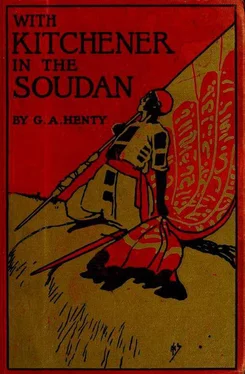The change that had occurred there during the past fortnight was striking. Then none but black faces could be seen; now it was the encampment of a British force with its white tents and all their belongings. The contrast between the newly-arrived brigade and the hardy veterans who had fought at the Atbara was striking. Bronzed and hearty, inured to heat and fatigue, the latter looked fit to go anywhere and do anything, and there was hardly a sick man in the four regiments. On the other hand, the new-comers looked white and exhausted with the heat. Numbers had alreacty broken down, and the doctors at the hospital had their hands full of fever patients. They had scarcely marched a mile since they landed in Egypt, and were so palpably unfit for hard work that they were, if possible, to proceed the whole way in boats in order to be in fighting condition when the hour of battle arrived.
The voyage up the river was an uneventful one. It seemed all too short to Gregory, who enjoyed immensely the rest, quiet, and comparative coolness. The Sirdar had gone up a week before they landed at Wady Hamed. Here the whole Egyptian portion of the army, with the exception of the brigade that was to arrive the next day, was assembled. The blacks had constructed straw huts; the Egyptians erected shelters, extemporized from their blankets; while the British were to be installed in tents which had been brought up in sailing boats. The camp was two miles in length and half a mile wide, surrounded by a strong zareba. The Egyptian cavalry and the camel corps had arrived. On the opposite side of the river was a strong body of friendly Arabs, nominally under the Abadar sheik, but in reality commanded by Major Montague Stuart-Wortley. By the 23rd of August the whole force had arrived, and the Sirdar reviewed them drawn up in battle array, and put them through a few manoeuvres as if in action. General Gatacre commanded the British division— Colonel Wauchope the first brigade, and Lyttleton the second. As before, Macdonald, Maxwell, and Lewis commanded the first three Egyptian brigades, and Collinson that newly-raised, General Hunter being in command of the division.
The force numbered in all about twenty thousand, and although destitute of the glitter and colour of a British army under ordinary circumstances, were as fine a body of men as a British general could wish to command, and all alike eager to meet the foe. The British division had with them two batteries and ten Maxims, and the Egyptian division five batteries and ten Maxims.
As Gregory was strolling through the camp he passed where the officers of one of the British regiments were seated on boxes round a rough table, over which a sort of awning had been erected.
"Come and join us, Hilliard. We are having our last feast on our last stores, which we got smuggled up in one of the gun-boats," the Major called out.
"With pleasure, sir."
The officer who was sitting at the head of the table made room beside him.
" You men of the Egyptian army fare a good deal better than we do, I think," the Major went on. " That institution of private camels is an excellent one; we did not know that they would be allowed. But after all it is not a bad thing that we did not have them, for there is no doubt it is as well that the soldiers should not see us faring better than they. There is bother enough with the baggage as it is. Of course it is different in your case. There are only two or three white officers with each battalion, and it would not strike your black troops as a hardship that you should have different food from themselves. They are living as well as, or better than, they ever did in their lives. Three camels make no material addition to your baggage-train, while as there are thirty or forty of us it would make a serious item in ours, and the General's keen eyes would spot them at once."
"Our camels are no burden to the army," Gregory said; "they only have a few pounds of grain a day, and get their living principally on what they can pick up. When they go on now, they will each carry fifty pounds of private grain. They get five pounds when there are no bushes or grass, so that the grain will last them for a fortnight."
"I suppose you think that the Dervishes mean fighting?"
" I think there is no doubt about it. All the fugitives that come in say that the Khalifa will fight, but whether it will be in the defence of Omdurman, or whether he will come out and attack us at Kerreri, none can say. The Khalifa keeps his intentions to himself."
"By the bye, Hilliard, I don't think you know my right-hand neighbour; he only joined us an hour before we started, having been left behind at Cairo sick. Mr. Hartley, let me introduce you to Mr. Hilliard—I should say Bimbashi Hilliard; he is on General Hunter's staff."
The young lieutenant placed an eye-glass in his eye and bowed to Gregory.
" Have you been in this beastly country long?" he asked.
"If you include Lower Egypt, I have been here eighteen years."
"Dear me!" the other drawled; "the climate seems to have agreed with you."
"Fairly well," Gregory replied; "I don't mind the heat much, and one doesn't feel it while one is at work."
" Hartley has not tried that yet," one of the others laughed; "work is not in his line. This most unfortunate illness of his kept him back at Cairo, and he brought such a supply of ice with him when he came up that he was able to hand over a hundredweight of it to us when he arrived. I don't think, Major, that in introducing him you should have omitted to mention that but for a temporary misfortune he would be the Marquis of Langdale; but in another two years he will blossom out into his full title, and then I suppose we shall lose him."
Gregory, whose knowledge of the English peerage was extremely limited, looked puzzled.
" May I ask how that is?" he said. " I always thought that the next heir to a title succeeded to it as soon as his father died."
"As a rule that is the case," the Major said, "but the present is an exceptional one. At the death of the late marquis the heir to the title was missing. I may say that the late marquis only enjoyed the title for two years. The next of kin, a brother of his, had disappeared, and up to the present no news has been obtained of him. Of course he has been advertised for, and so on, but without success. It is known that he married, but as he did so against the wish of his father he broke off all communication with his family, and it is generally supposed that he emigrated. Pending any news of him the title is held in abeyance.
"He may have died; it is probable that he has done so, for he could hardly have escaped seeing the advertisements that were inserted in every paper. Of course, if he has left children they inherit the title. After a lapse of five years Mr. Hartley's father, who was the next heir and who died five years ago, applied to be declared the inheritor of the title, but the peers or judges or someone decided that twenty-one years must elapse before such an application could be even considered. The income has been accumulating ever since, so that at the end of that time it is probable that Mr. Hartley will be allowed to assume the title.
" Will the estates go with the title, Hartley?"
"Oh, I should say so, of course!" the other drawled; "the title would not be of much use without them."
"Nonsense, my dear fellow!" another said; "why, a fellow with your personal advantage and a title would be able to command the American market and to pick up an heiress with millions."
The general laugh that followed showed that Hartley was by no means a popular character in the regiment.
"The fellow is a consummate ass," the man on Gregory's left whispered. "He only got into the service as a Queen's cadet; he could no more have got in by marks than he could have flown. No one believes that he had anything the matter with him at Cairo; but he preferred stopping behind and coming up by himself without any duties, to taking any share in the work. He is always talking about his earldom, —that is why the Major mentioned it, so as to draw him out."
Читать дальше












